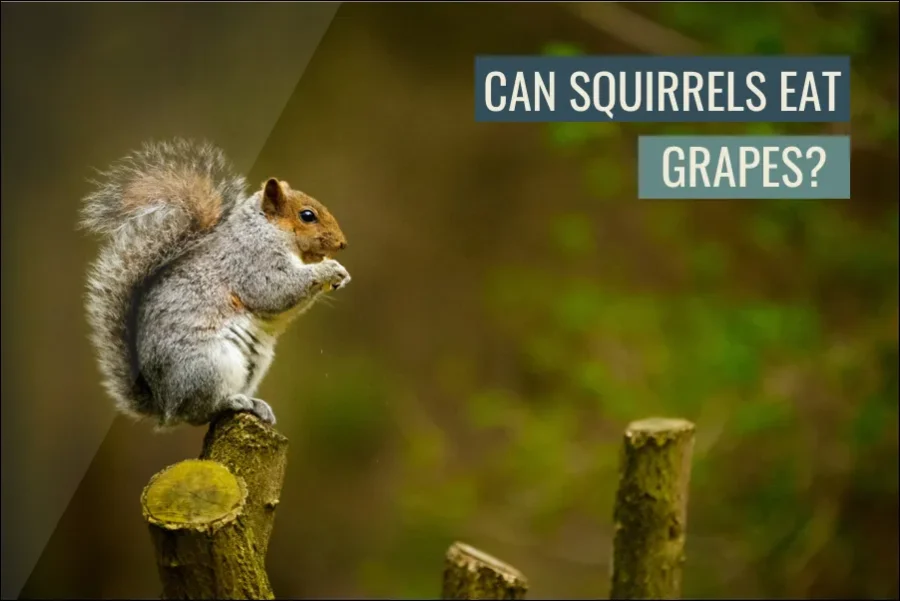
You’re enjoying a afternoon snack of fresh grapes when you notice a curious squirrel watching from nearby. Those bright, intelligent eyes seem to be asking for a taste, but you pause – are grapes actually safe for squirrels?
Squirrels can eat grapes safely in small amounts. Fresh grapes provide natural sugars, vitamins, and hydration that squirrels can digest without harm. However, grapes should only be offered as an occasional treat, not a regular food source, due to their high sugar content.
Why Grapes Are Safe for Squirrels
Unlike some fruits that contain compounds toxic to wildlife, grapes pose no immediate danger to squirrels. Their digestive systems can process the natural sugars and acids found in grapes without adverse effects. Wild squirrels occasionally encounter wild grapes in their natural habitat, indicating their ability to safely consume this fruit.
The water content in grapes can provide valuable hydration, especially during hot summer months when natural water sources may be scarce. This makes grapes particularly beneficial during drought conditions or in urban areas where clean water access is limited.
Grapes contain antioxidants like resveratrol and vitamin C, which can support a squirrel’s immune system. These compounds help protect against cellular damage and may contribute to overall health when consumed as part of a varied diet.
Nutritional Benefits of Grapes for Squirrels
Fresh grapes offer several nutrients that complement a squirrel’s natural diet. The vitamin C content supports immune function and helps with iron absorption from other food sources. B vitamins present in grapes aid in energy metabolism and nervous system function.
The natural sugars in grapes provide quick energy that active squirrels can readily utilize. This makes grapes particularly valuable during periods of high activity, such as during nut gathering season in fall or when nursing mothers need extra calories.
Potassium in grapes supports proper muscle and heart function, while the fiber content aids in healthy digestion. These nutrients work together to support the squirrel’s overall physiological needs.
How Much Grape Is Too Much?
Moderation remains crucial when offering grapes to squirrels. A few grapes per week represents an appropriate amount for an adult squirrel. Overfeeding grapes can lead to digestive upset and may discourage squirrels from seeking out their essential natural foods.
Young squirrels should receive even smaller portions, as their developing digestive systems are more sensitive to dietary changes. One or two grape halves weekly is sufficient for juvenile squirrels.
The high sugar content means that excessive grape consumption could contribute to dental problems or disrupt the squirrel’s natural foraging behaviors. Understanding proper squirrel nutrition helps ensure that treats like grapes enhance rather than replace their natural diet.

Fresh vs. Dried Grapes: What’s the Difference?
Fresh grapes are always preferable to dried varieties when feeding squirrels. Raisins and other dried grapes concentrate the sugar content significantly, making them less suitable as treats. The dehydration process also removes much of the beneficial water content that makes fresh grapes valuable.
Some commercially dried grapes contain added sugars or preservatives that could be harmful to squirrels. Stick to fresh, organic grapes when possible to avoid exposing squirrels to unnecessary chemicals.
The texture difference also matters – fresh grapes provide beneficial chewing exercise that helps maintain dental health, while soft raisins don’t offer the same oral benefits.
Proper Ways to Offer Grapes to Squirrels
When sharing grapes with squirrels, preparation matters for both safety and enjoyment. Wash grapes thoroughly to remove any pesticide residues or contaminants that could harm wildlife. Organic grapes eliminate this concern entirely. Unlike chocolate, which is toxic to squirrels, grapes poses no inherent danger when fresh.
Cut larger grapes in half to prevent choking hazards, especially for smaller squirrel species. This also makes the fruit easier for squirrels to handle and consume at their own pace.
Remove any damaged or moldy grapes before offering them, as spoiled fruit can cause digestive problems. Fresh, firm grapes ensure the best nutritional value and safety.
Signs of Grape Overconsumption in Squirrels
Watch for indicators that a squirrel may be consuming too many grapes or other sugary treats. Loose stools or diarrhea can signal dietary imbalance or overconsumption of high-sugar foods.
Reduced interest in natural foods like nuts, seeds, and vegetation may indicate that treats are becoming too prominent in the squirrel’s diet. Healthy squirrels maintain diverse foraging behaviors and shouldn’t become dependent on human-provided foods.
Lethargy or changes in normal activity patterns could suggest digestive upset from inappropriate feeding. Healthy squirrels remain active and alert throughout their normal daily routines.
Alternative Healthy Treats for Squirrels
Variety in treats helps ensure balanced nutrition and prevents over-reliance on any single food source. Natural foods that squirrels can safely eat include small pieces of apple, berries, and unsalted nuts.
Vegetables like small carrot pieces or leafy greens provide different nutrients and textures that squirrels appreciate. These alternatives offer nutritional benefits while satisfying the desire to interact with wildlife.
Seeds from squash or pumpkins make excellent natural treats that align closely with squirrels’ natural dietary preferences. These options encourage natural foraging behaviors while providing appropriate nutrition.
Creating a Squirrel-Friendly Environment
Beyond occasional treats, supporting squirrels involves creating environments that meet their natural needs. Providing fresh water sources helps ensure proper hydration regardless of treat offerings.
Natural food sources like nut trees, berry bushes, and native plants create sustainable feeding opportunities that don’t require human intervention. Helping squirrels throughout different seasons involves understanding their changing nutritional needs.
Avoiding pesticides and chemicals in areas where squirrels forage protects their health and ensures that any natural foods they consume remain safe and nutritious.
Understanding Squirrel Behavior Around Food
Squirrels exhibit interesting behaviors when offered new foods like grapes. They may initially be cautious, taking small tastes before determining if the food is safe and appealing.
Burying behavior is common – squirrels may attempt to cache grapes just like nuts, though the high moisture content makes this unsuccessful. This behavior demonstrates their natural food storage instincts. This is why bread is problematic for squirrels – processed foods often contain additives that wildlife can’t handle properly.
Social dynamics around feeding can become complex when multiple squirrels are present. Understanding why squirrels behave certain ways around food helps create positive interactions that benefit all individuals.
Regional Considerations for Grape Feeding
Different geographic regions present varying challenges and opportunities when it comes to feeding grapes to squirrels. In warmer climates, grapes may spoil more quickly when left outside, creating potential health hazards if squirrels consume fermented or moldy fruit.
Cold weather regions require different considerations, as frozen grapes can present choking hazards or dental damage risks. During winter months, the extra calories from grape sugars may be more beneficial as squirrels burn additional energy maintaining body temperature. Peanut butter can be offered in similar moderation, though it’s much higher in fat and protein than grapes.
Urban environments often have different squirrel populations with varying dietary experiences compared to rural areas. City squirrels may be more accustomed to diverse human foods but could also be more susceptible to dietary imbalances from well-meaning feeding.
Suburban areas typically offer the best balance, where squirrels maintain access to natural food sources while occasionally benefiting from appropriate human-provided supplements like grapes.
Common Mistakes When Feeding Grapes to Squirrels
Many wildlife enthusiasts make well-intentioned errors that can reduce the benefits of grape feeding. Offering grapes daily transforms a healthy treat into a dietary problem, as squirrels may begin to expect and depend on this food source.
Leaving whole clusters of grapes accessible encourages overconsumption and can lead to food aggression among multiple squirrels. Individual grapes or small portions prevent competitive behaviors and ensure more equitable distribution.
Feeding grapes near bird feeders or other wildlife feeding stations can create territorial disputes and stress among different species. Designated feeding areas help maintain peaceful coexistence between various backyard wildlife visitors.
Some people mistakenly believe that if grapes are safe, then all grape products are equally appropriate. Grape juice, grape-flavored snacks, and wine grapes treated with chemicals all present different risks that fresh table grapes do not.
Seasonal Timing for Grape Treats
The timing of grape offerings can significantly impact their value to squirrel populations. Late summer and early fall represent optimal periods when fresh grapes are naturally available and squirrels are actively building energy reserves for winter.
Spring grape feeding should be minimal, as this is when squirrels naturally focus on fresh vegetation and tree buds that provide essential nutrients after winter. Excessive treats during this period can interfere with natural dietary transitions.
Winter grape offerings can provide valuable extra calories, but frozen grapes pose safety concerns. Room temperature grapes offered during cold snaps can provide both nutrition and hydration when other water sources may be frozen.
Summer feeding requires careful attention to spoilage rates and hydration benefits. During hot weather, the water content in grapes becomes particularly valuable, but the fruit must be consumed quickly to prevent fermentation.
